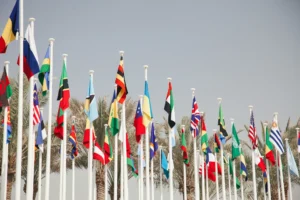A Tragicomedy in the Development Sector
For decades, USAID was the flashy, overbearing rich uncle of the development world—showing up unannounced, throwing money at problems and expecting applause. But lately, something’s off.
The funding taps are drier than an IMF austerity plan and project managers from Nairobi to New Delhi are experiencing the dreaded donor cold shoulder.The gossip mills at the UN, World Bank, and every overpriced café in Washington, D.C. are working overtime:
Is USAID on its period, or is America just having one long pregnancy mood swing?
One day, they’re promising billions for climate resilience, education, and healthcare. The next? They’re ignoring calls, avoiding eye contact in development meetings, and pretending they don’t recognize their own commitments. It’s like watching a flaky billionaire forget they RSVPed to a wedding.
The Climate Sector: The Breakup That Wasn’t
At the latest COP summit, climate activists showed up like heartbroken exes, waiting for a USAID speech that never came.
“You know what’s worse than ghosting?” sighed one environmental policy expert. “Mixed signals.”
First, USAID promised billions for climate change adaptation. Then, the funds “got delayed.” Then, they resurfaced—but only for American companies doing “green innovation” (read: selling expensive solar panels to countries that just wanted functioning electricity grids).
“It’s like they want credit for the relationship but none of the responsibility,” muttered a diplomat from a Pacific island nation. “They take us out to dinner, but the moment we mention commitment, they ‘suddenly have a flight to catch.’”
Global Health: Left on Read
Meanwhile, in the global health sector, abandoned project proposals are piling up like unread Tinder messages.
“We were the golden child,” lamented a Global Fund advisor. “HIV, malaria, maternal health—USAID used to be obsessed with us. But ever since COVID stopped trending, we’re getting the classic ‘new phone, who dis?’ treatment.”
An anonymous WHO official whispered:
“They pulled out of global health so fast, I half-expected them to leave their toothbrush behind.”
Education: No More Love Letters
Education NGOs saw this coming. They know the game.
“You think we expected long-term commitment? Please,” scoffed an education sector director. “We just wanted a text back.”
Once upon a time, USAID was all about girls’ education and literacy programs. Now? The budgets are thinner, the enthusiasm is forced, and suddenly, America has “other priorities.”
“It’s like we were in a long-distance relationship, and they just stopped answering,” sighed a UNESCO consultant. “No breakup message, no closure, just a slow fade into irrelevance.”
Why the Cold Shoulder? America Is Nesting
At the World Bank, a veteran economist (who swears he’s quitting every year but never does) summed it up:
“America is nesting. They’re obsessed with their own problems—border security, inflation, elections, and of course, China. It’s like they’re having pregnancy cravings, but instead of pickles and ice cream, they just want military budgets and tax cuts.”
Menstrual Diplomacy: The Classic USAID Cycle
Some experts argue USAID is simply going through its usual “menstrual diplomacy” phase:
- First Trimester: The honeymoon. Grand speeches, billion-dollar pledges, and photo ops with smiling schoolchildren.
- Second Trimester: The mood swings. Budgets get “restructured,” funds take “longer to disburse,” and officials start getting very busy with domestic issues.
- Third Trimester: Full-on withdrawal. A new administration enters, rebrands everything, and ghosts half of their past commitments.
- Postpartum Phase: They pop back in—but only when China starts flirting.
The UN and Global South: Waiting for a ‘U Up?’ Text
Despite everything, the Global South isn’t blocking USAID just yet. After all, they’ve seen this pattern before.
“America might ignore texts,” said a development professional with a knowing smirk, “but the moment China starts sliding into our DMs with a billion-dollar infrastructure loan, they’ll be back with ‘Hey… been thinking about you. Let’s talk partnerships.’”
For now, development professionals will keep refreshing their inboxes, waiting for that magical email that says, “Funding approved.” And until then? They’ll keep whispering in the corridors, speculating over lattes, and preparing for the next dramatic USAID mood swing.



